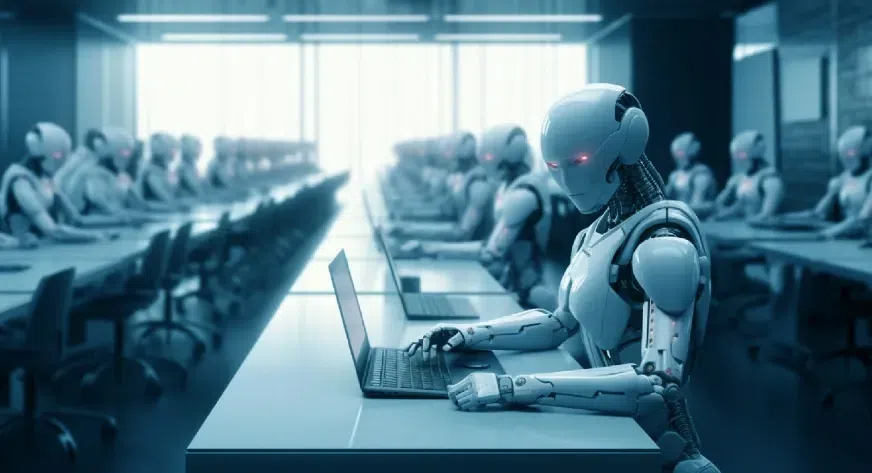
Is my job at risk of being replaced by AI? This is a question on everyone’s mind, and with good reason.
As artificial intelligence rapidly transforms industries, many roles are being redefined or automated altogether. But not all jobs are at risk. In fact, according to a new report by Upwork, there are more than 120 roles that AI is unlikely to replace anytime soon.
These jobs share something in common: they rely on human connection, creativity, empathy, hands-on skill, or ethical judgment. These are qualities that current AI tools can’t fully replicate. These roles prove that the future of work is not just about technology, but also about what makes us uniquely human.
ALSO READ: 5 industries that AI is quietly taking over
These 120 roles, spanning diverse industries, are too extensive to list, so it has been divided into nine main categories:
Jobs AI Can’t Replace
1. Healthcare
AI can assist with medical records or diagnostics, but human caregivers remain essential. Among unreplaceable roles are:
Doctors, nurses, nurse practitioners
Mental health professionals (psychiatrists, therapists, counsellors)
Physical therapists, pharmacists, midwives, veterinarians
Support staff (home health aides, medical assistants, dental hygienists)
Social Workers
Crisis Counselors
Therapists and Psychologists
2. Skilled Trades
Automation can provide guidance, but not manual craft. The human touch is irreplaceable in:
Electricians
Welders
HVAC Technicians
Landscapers
Auto Mechanics
Masons
Carpenters
Plumbers
Tailors
Chefs (especially haute cuisine or street food)
RELATED: Step-by-Step Guide: How to use ChatGPT to apply for jobs
3. Education & Research
AI can streamline prep work, but it cannot replicate teaching presence, mentorship, or discovery in:
K-12 teachers, university professors, tutors
Researchers in history, archaeology, and anthropology
Support roles like TAs, library techs, and museum educators
Teachers (especially early childhood & special education)
4. Service & Personal Care
Empathy and human interaction cannot be automated. Secure roles include:
Massage therapists, hair stylists, tattoo artists, tailors, and pet groomers.
5. Leadership, Legal & Business
AI supports tasks, but judgment, ethics, and strategy remain human domains:
Judges, legal mediators, lawyers
CEOs, HR managers, ethicists, and policy leads
Paralegals, executive assistants, and compliance officers
6. Creative Roles
These rely on imagination, originality, and emotional nuance, areas AI still struggles with.
Copywriters
Art Directors
Brand Strategists
Creative Directors
Music Producers
Voice Actors
Illustrators
Choreographers
Film Directors
Fashion Designers
Animation Storyboard Artists
Set Designers
YOU MIGHT LIKE: 5 digital skills you need to survive in the age of AI
7. Technical Roles
While AI can assist, it cannot fully replace the expertise, contextual judgment, or accountability these roles require:
Ethical Hackers
Cloud Architects
Robotics Engineers
Systems Analysts
AI/Machine Learning Engineers (ironic, but true!)
Cybersecurity Analysts
Blockchain Developers
Network Engineers
Database Administrators
Embedded Systems Engineers
8. Strategic Roles
These require high-level thinking, business insight, and decision-making grounded in human context.
Product Managers
Business Development Leads
Operations Managers
Innovation Consultants
Growth Hackers
Change Management Experts
Corporate Strategists
Risk Management Analysts
Financial Planners
Sustainability Consultants
9. Human-Centred Roles
These thrive on empathy and interpersonal connection
Career Coaches
Customer Success Managers
Conflict Mediators
Diversity, Equity & Inclusion Specialists
Life Coaches
ALSO READ: 5 High-paying Nigerian jobs that don’t require a university degree
Why These Roles Stay Human-Centred
AI excels at structured, repetitive tasks, but struggles with:
Emotional intelligence & empathy
Physical dexterity & field problem-solving
Creative thinking, nuance, and strategy
This means roles requiring human connection, judgment, and hands-on skills remain essential. AI is transforming many industries, enhancing efficiency, not eradicating human roles. The common thread across resilient professions is the reliance on:
Physical, hands-on skill (trades, healthcare support)
Social/emotional dynamics (leadership, personal services)
Complex judgment and ethics (legal, executive functions)
Human presence (teaching, caregiving)
If you’re in or entering one of these fields, AI is more likely to support and augment your role, leaving you to focus on the human-centric core of your job. But you must upskill accordingly so you can combine domain expertise with AI literacy to maximise impact and remain competitive.
